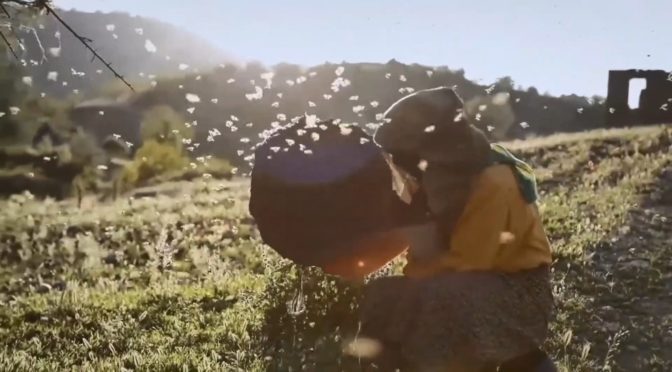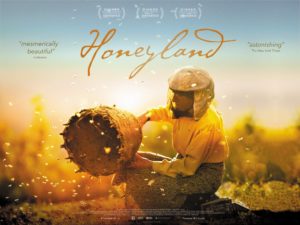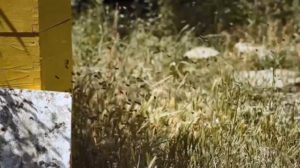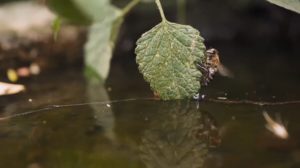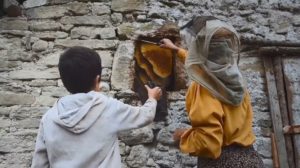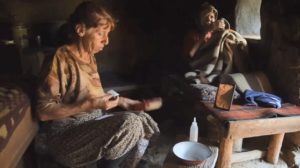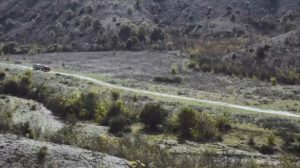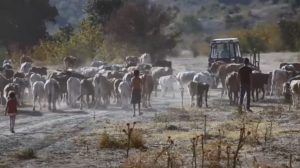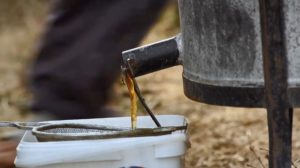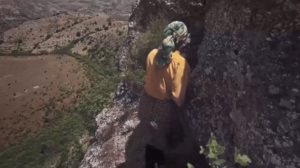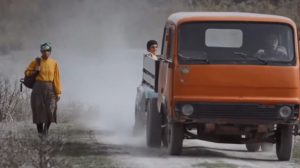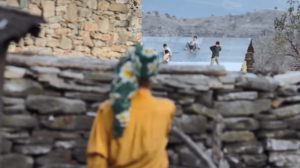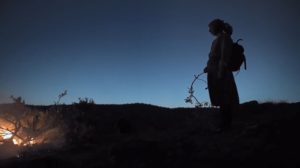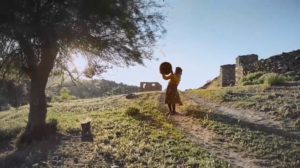I’m an animal lover through and through, so it goes without saying that my ravenous film preoccupation includes keeping track of my favorite non-human performances of the year and choosing my favorite. This year was not too shabby at all for animals in film from Brandy the Manson-hating pitbull to Parasite‘s trio of perfectly cast frou-frou dogs, to that singing chihuahua in The Farewell. Stand up and take a bow, you noble beasts of cinema! But my favorite piece of film fauna for the year of our Lord 2019 is not a single animal but hundreds, maybe thousands of them. I, Brady Larsen, lifelong phobic of all airborne stinging creatures, declare my favorite film animals of 2019 goes to a hive of wild Macedonian bees. Yep, this feels right. This feels like progress. While our celluloid creatures served valuable roles to their narratives all year, none of them were quite so poignant and impactful as a righteously livid hive of pollinators in 2019’s best documentary, Honeyland, directed by Macedonian filmmakers Ljubomir Stefanov and Tamara Kotevskov. The honey bee has become the mascot of the burgeoning environmental crisis in recent years, its dwindling populations endemic and symbolic of the ticking clock on this ecological timebomb we are trying so feverishly to disarm. Here, the honey bee gets a leading role in a small and very focused documentary that serves as a microcosm of the ideas that have become central in the discourse over environmental stewardship: knowledge, ignorance, hubris, economic leverage, and the inevitability of scientific fact. What more apt an avatar for an Earth increasingly weary of our bullshit than a swarm of once-peaceable bees stinging their foolish human handlers?
Honeyland drops us into the stark, hot, craggy mountains of Macedonia without preamble. Honeyland does not feature a single interview, title card, or bit of voiceover. Our main subject is Hatidze Muratova, a 50-something Macedonian woman and one of the only remaining wild beekeepers. Shot from high above, the film opens with Hatidze trekking along the side of a high cliff to remove a honeycomb from the sheer rock face. She does this calmly, confidently and often without protective gear. Her philosophy is to always leave half of the honeycombs for the bees, which gives them enough food to survive and sustain their population. It also just seems fair. Hatidze’s only family is her ailing mother, who she supports and takes care of. Hatidze spends most of her days in their tiny cottage and tending to the hive she keeps in the stone ruins of a nearby old house. To make money to feed them, she takes a passenger train to the capitol, Skopje, and sells jars of honey to vendors at the street markets. Hers is a rugged and mostly solitary life, until the day it becomes a lot less solitary. One day, a trailer comes lumbering down the dirty road and pulls into the lot next door. It brings with it a cloud of dust and the noisy and numerous Sam family, a desperately poor clan of Turkish itinerant farmers. They consist of a husband and wife, Hussein and Lutvie, and seven children ranging from toddler to teenager. I have no expertise whatsoever in agriculture, but it is immediately clear that the Sams are horrendous farmers. That’s unfortunate, because it appears to be their sole livelihood. The Sams are a hapless, squabbling lot and the disorganized herd of cattle they arrive with only furthers the image that they are ambassadors of reckless human chaos. Soon after arriving, Hussein gets it into his head that he should do some beekeeping, which friendly, selfless Hatidze is happy to advise him in. Shambling though the Sams may be, Hatidze seems initially happy to have a little company and giving lessons in her trade to the most responsible of the Sam children gives the childless beekeeper some satisfaction. The real trouble arrives in the form of a buyer friend of Hussein’s, who is pushing him to produce a very large shipment of honey for him to sell. Hatidze repeatedly reminds Hussein that he must leave half of his honeycombs in order for the local hives to maintain a healthy balance. The buyer nonchalantly demands 200 kilograms of product. With Hatidze’s time-tested reason on one shoulder and stubborn economic forces on the other, Hussein eventually shuts out the wisdom he’s been given and submits to rapacious demand. Hatidze warns him that taking too much from his bees will leave them hungry and cause them to attack her hives. In the end, the Sams cannot resist their human frailty, exacerbated as it is by dire poverty, and the result is a small-scale ecological and human disaster.
Honeyland could have been the informative and beautiful (the golden-tinted shots of the sun-baked Mediterranean mountains and rivers is quite lovely) account of an ancient agricultural practice; a professional ethnography rolled into one. But the introduction of the dysfunctional Sams brings genuine tension into this tiny corner of the world. And a wolf follows close behind them. Honeyland is one of the sharpest narratives about greed and scarcity I have ever seen. You can emphasize with the Sams up to a point. They do not have many options for survival. They exist always on the knife’s edge of ruin and starvation. To Hussein’s mind, the environmental nuance Hatidze preaches is a luxury he cannot afford. The trouble is that he cannot truly afford to ignore that advice either, though the consequences of ignoring it may be slightly slower to manifest. But Hussein’s indulgence is bound to fail before very long, and it not only jeopardizes his family’s survival but that of his neighbor. It feels odd to call a dirt impoverished nomad family greedy, but what other word can there be for a person who willfully and knowingly takes more than is feasible? This is the insidious and maddening power of need to subjugate rational thought. What Hussein tries to do will not work, he knows it deep down, and yet he must proceed along this ruinous course anyway. It’s the only choice that leaves him with any illusion of agency. It’s the active option, where the other requires discipline and forbearance. The forces of the market have him by the throat and, in his panic, he does not have the courage or the cool foresight to tell them no. His tragedy is to be a coward and a rube. In sum, he is everything his female neighbor is not: ignorant, short-sighted, and impatient.
I imagine a lot of women professionals can and will relate to Hatidze. She should be familiar to anyone who has worked their asses off to become great at their jobs and then had to coddle some guy who doesn’t have the first idea of what he’s doing. Hatidze isn’t just good at her job, she is an absolute maestro at it. She is so stellar at wild beekeeping that she is one of the precious few left on the European continent who still attempts it. From what we see in the film, wild beekeeping appears to be an arduous and nuanced process, one requiring both a lot of technical know-how and a kind of intuition born out of a lifetime of practice. Hussein Sam rolls into town with his cows and his chickens and his bickering familiars and, after a couple of days, thinks, “Sure, I guess I could keep bees.” Honeyland is a microcosm of how societies routinely wave off the counsel of their women. When Hatidze points out that Hussein’s unsustainable overproduction is leading his bees to attack her hive, he impotently argues that there must be some other reason for it. At one point the Sam parents blame their kids, one of whom had loudly insisted that they should be heeding their neighbor’s advice. Hussein’s ego can’t square the notion that he is wrong or that this slender woman is infinitely smarter and hardier than him when it comes to living off the land. Honeyland has a potent feminist punch to it, but it also puts its finger on a larger social ill that transcends the genders. If we are to survive as a species, a lot of people are going to need to locate some humility within themselves and start deferring to people who know better than them. Expertise must be allowed to trump ego and self-interest. I’m currently sitting in my living room for the 28th consecutive day, when I would certainly rather be writing this review by way of a nice, sunny pub crawl. That would be an immediately more enjoyable course for me, but a pandemic is escalating outside and people who know all about deadly viruses have told me, a person whose key area of knowledge is movies and music, that this would wreak havoc on my community’s health. Which, of course, includes my own. So I’m staying indoors because people who have dedicated their lives to this kind of thing say it’s the right thing to do and I have zero counter-argument to offer. It’s a painful thing to watch Hussein ignore the his brilliant neighbor’s words and press recklessly along with his own way. It’s an even more painful and fundamentally unfair thing that the very person he ignores must then share in the injury his rashness causes. And it’s a very disquieting thing to consider the larger societal implications of this latest episode in failed neighborly relations. We all make up a society and, however much we try to behave as individuals, we will all share the same fate if we fail to listen to the wise among us. We must learn to accept knowledge and fact, or we will all soon bear the burden of each other’s hubris.
Honeyland is 2019’s best documentary, but its greatest feat is that you could mistake it for one of the year’s best dramas if you didn’t know any better. The directors happened onto their subject by happy accident while researching a nature documentary, and then, in the course of filming Hatidze’s work, the Sam family sputtered into the picture. It must have felt like a documentarian’s dream seeing this all unfold so unexpectedly and in such literary fashion. The raw stuff of life that takes place in Honeyland feels like it could be in some beautifully simple and sparely soulful morality tale. A story of two different kinds of people sharing a space together, tentatively bonding and then coming into a conflict that eloquently exposes the differences between them. When the Sams exit the frame, leaving behind their blighted tract, you feel you have looked deep into the soul of Hatidze and Hussein, and you know exactly who they both are. The themes of wisdom, generosit, pride, and accountability to our fellow human beings are timeless, as old as civilization itself. Honeyland could have been a Robert Bresson film in the 1950s or an Abbas Kiarostami film in the 1990s or a Sophocles play in Classical Greece. I bet Chekhov would have loved to sculpt this material; two neighbors in dispute over the Earth they share. Honeyland is a film of subtle, shrewd behavioral observation, with a weighty sense of what is right and wrong and how the weaker of us can be swayed from the ethical path. It is as elegant a rumination of the social contract and how it breaks down as any film I can presently recall. Its characters, with all their virtues and failings, could not have been written with more clarity and understated insight. Its allegorical force is so clean and devastating, I simply could not believe it didn’t come from the page of a script or some celebrated novel. And, man alive, those righteous, reproachful bees make one Hell of a Greek chorus! Honeyland is an endlessly rich parable about being a human being and a neighbor; to those we share a street with, a nation with, and a planet with.
When was the last time we created a new folk hero? A larger than life figure that speaks to our relationship with the wild lands that we toil to bend to our will; a Johnny Appleseed or a Paul Bunyan? I hereby nominated Hatidze Muratova, the soft-spoken, iron-willed messenger between man and bee. A self-sufficient, indomitable half-deity carved out of the marble of the Vardar Mountains, and also just a polite and knowledgeable credit to her profession and to environmental responsibility in general. She’s a better folk hero than Paul Bunyan, especially for this moment in history. Bunyan represented the seemingly limitless abundance of a frontier that, only a couple centuries later looks anything but infinite. Hatidze is the hero to teach us about scarcity, about how to slow the Earth’s clock and make the absolute most of the resources we have at hand. It is people like Hatidze Muratova, rugged scientists of the land, who deserve our adulation in this challenging age. She may not be an actual giant like Paul Bunyan, but she is scrappy and plainspoken and humble in the face of nature. The Sams leave us in the end, but Hatidze remains, and that alone gives this small-scale tragedy a closing note of determined home and triumph. It is inspiring to think of her still out there in those mountains, respecting and perfecting her trade and setting a sterling example for how to prolong our stay on this blue sphere. Hatdize shall go on, and we can all go on with her if we start making wiser decisions about the kinds of people we look up to and listen to.
